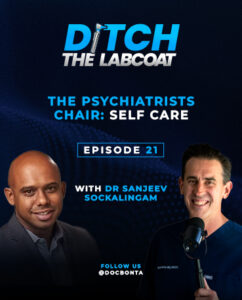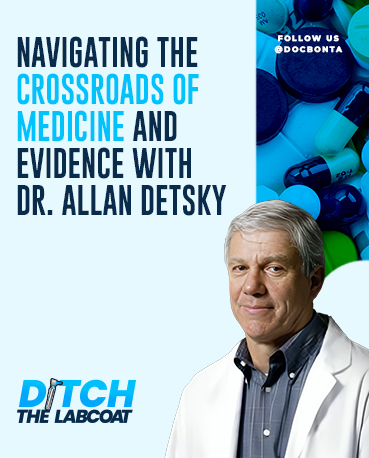This week, I hosted none other than Dr. Allan Detsky, a veritable legend in evidence-based medicine, health policy, and, as it turns out, Broadway production. (Yes, this man has Tony nominations—more on that later.)
The conversation spanned decades of medical evolution, the intricacies of applying clinical evidence to real-world patients, and the uneasy marriage between healthcare and the pharmaceutical industry. Here’s what we learned:
Evidence-Based Medicine: A Work in Progress
Dr. Detsky unpacked the paradox of evidence-based medicine: it’s one of modern healthcare’s greatest achievements, but it’s not the panacea many assume. Sure, randomized controlled trials (RCTs) have revolutionized our understanding of treatments, but they cover only about 15% of the decisions a practicing doctor makes. Why? Because most studies focus on hyper-specific populations—like under-65-year-old men with stage 4 cancer—leaving the rest of us (like your grandma with heart disease and arthritis) in uncharted waters.
Takeaway: The next time your doctor mentions “evidence,” remember they’re often extrapolating. Medicine is equal parts science and art.
The Pharmaceutical Industry: Friend or Frenemy?
Dr. Detsky didn’t shy away from the complexities of Big Pharma. He acknowledged their vital role in funding RCTs (because let’s face it, kale farmers don’t have billion-dollar budgets to test the benefits of salads). But he also cautioned against ignoring their profit motives.
The pharmaceutical industry isn’t inherently evil, he argued; it’s just doing what businesses do—seeking returns on investment. That’s why blockbuster drugs for chronic conditions like type 2 diabetes or obesity get all the R&D love, while one-off treatments for rare infections get left behind.
Takeaway: Pharmaceutical companies create life-changing drugs, but we should always scrutinize who’s funding the studies that guide our care.
Lifestyle Changes: The Unstudied Frontier 

One of the podcast’s most sobering revelations was how little we actually know about the health impacts of sleep, exercise, and nutrition. Why? Because there’s no billion-dollar corporation funding studies on the benefits of napping or kale smoothies. Instead, we’re left with anecdotal evidence and the occasional small-scale trial.
Meanwhile, the rise of medications like Ozempic (which promises weight loss and glucose control, but not much lifestyle improvement) is emblematic of a healthcare system built to treat, not prevent.
Takeaway: Don’t underestimate the power of lifestyle changes—even if they’re not “evidence-based.”
Episode 33: Weighting In With Lipid Specialist
Episode 21: The Psychiatrist Chair: Self-Care
Social Media and the Skeptic’s Dilemma
Dr. Detsky and I dove into the fascinating (and frustrating) world of healthcare debates on platforms like Twitter (now “X”). From vaccine conspiracies to carnivore diet evangelists, misinformation runs rampant. But here’s the catch: even the most outrageous claims are rooted in legitimate concerns, like skepticism of Big Pharma or distrust in regulatory bodies.
Takeaway: The key isn’t to dismiss skeptics but to engage with them thoughtfully. And maybe skip the comments section. Er, definitely skip the comment section.
The Future of Healthcare: Progress and Polypharmacy
Where is healthcare headed in the next 10 to 15 years? Dr. Detsky painted a mixed picture. On the one hand, advances in medicine (from cancer treatments to personalized care) will undeniably improve lives. On the other, we’re likely to see a growing reliance on daily medications—especially for chronic conditions.
He highlighted back pain as an example of a condition we still barely understand, let alone treat effectively. And when it comes to layering on interventions, polypharmacy (taking multiple drugs) introduces risks that haven’t been fully studied.
Takeaway: The future of healthcare will be both brighter and more complicated. Prepare for better treatments—and more pills.
Closing Thought: A Balancing Act
Dr. Detsky reminded us that medicine is as much about pragmatism as it is about science. Whether it’s making decisions with incomplete evidence or navigating the ethical minefields of industry partnerships, healthcare is a balancing act.
As we wrapped up the episode, we penned a new quote, destined for coffee mugs and t-shirts worldwide: “The good comes with the bad. Shame on us if we don’t understand that.”

